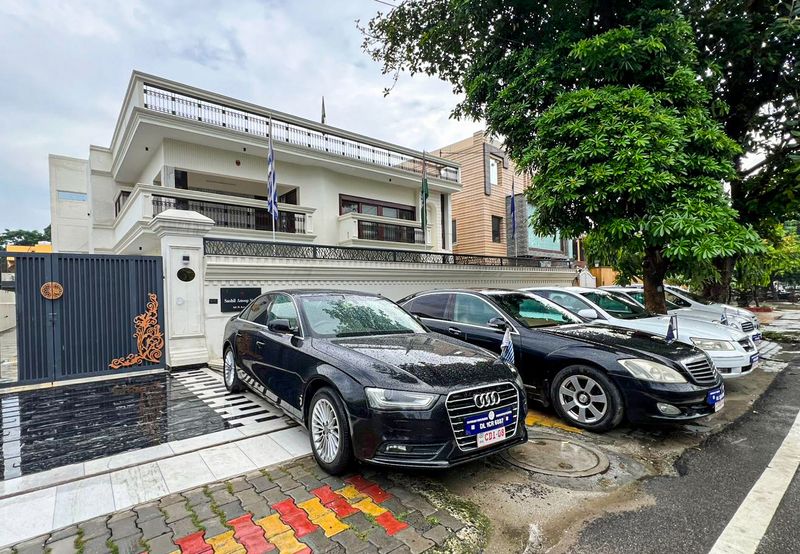
In a bizarre case of diplomatic deception, a man from Ghaziabad, India, was arrested for allegedly creating and representing fictitious nations from his rented home, situated less than 35 kilometers from the capital, Delhi. The self-styled diplomat, Harsh Vardhan Jain, claimed to represent nations such as “West Arctica,” “Saborga,” “Lodonia,” and “Poulvia.”
The Uttar Pradesh Police’s Special Task Force (STF) apprehended Jain on Tuesday, uncovering a trove of evidence including Rs 44.7 lakh in cash, foreign currencies, multiple forged diplomatic passports, and 18 fake diplomatic number plates.
The Illusion of Diplomacy
Jain’s operation was as elaborate as it was audacious. His residence, masquerading as a consulate, displayed flags of these imaginary nations and was flanked by a fleet of luxury cars, each adorned with special blue-colored number plates. The facade was convincing enough to deceive many, at least for a while.
A simple internet search, however, quickly dispels the illusion. “West Arctica” is known to be a non-profit organization focused on climate action and an unrecognized micronation in Antarctica. Lodonia is similarly a self-declared entity in southern Sweden, lacking official recognition. Searches for Saborga and Poulvia reveal scant information, underscoring their fictitious nature.
The Arrest and Its Implications
The arrest of Jain marks a significant breakthrough for the local authorities, who have been cracking down on fraudulent activities in the region. According to the police, the investigation into Jain’s activities began after they received a tip-off about suspicious diplomatic activities in the area.
Upon raiding Jain’s residence, the STF discovered not only the cash and fake documents but also a sophisticated setup designed to mimic the operations of a legitimate embassy. The discovery of multiple forged diplomatic passports suggests that Jain may have been planning to expand his fraudulent operations further.
Understanding Micronations
Micronations are self-declared entities that claim independence but are not recognized by world governments or major international organizations. They often emerge as social experiments, artistic projects, or simply as a hobby. While some, like the Principality of Sealand, have gained a degree of notoriety, most remain obscure.
Jain’s choice of micronations like West Arctica and Lodonia as the basis for his deception highlights the blurred line between playful micronationalism and fraudulent activities. By exploiting the concept of micronations, Jain was able to weave a narrative that, at least superficially, appeared credible.
Expert Opinions and Historical Parallels
Experts in international law and diplomatic studies have expressed concern over the potential implications of such fraudulent activities. Dr. Anjali Verma, a professor of international relations, noted that while micronations are generally harmless, their misuse for fraudulent purposes could undermine legitimate diplomatic processes.
“The creation of fake embassies not only defrauds individuals but also poses a risk to international relations by potentially damaging the trust in diplomatic institutions,” said Dr. Verma.
Historically, there have been instances of individuals attempting to create fictitious states for various reasons, ranging from political statements to outright scams. However, the scale and sophistication of Jain’s operation are particularly noteworthy.
Looking Ahead
The arrest of Harsh Vardhan Jain serves as a reminder of the need for vigilance against fraudulent activities, particularly those that exploit the complexities of international diplomacy. The authorities are now focused on tracing any potential victims of Jain’s scheme and preventing similar incidents in the future.
As the investigation continues, the case has sparked a broader discussion on the nature of micronations and their place in the modern world. While they often exist on the fringes of legality, the line between harmless eccentricity and criminal activity can sometimes become perilously thin.
For now, the story of the fake embassies in Ghaziabad stands as a testament to the lengths some will go to in pursuit of deception, and the ongoing efforts of law enforcement to bring such schemes to light.






